September 25 - October 11, 1992, CAT ON A HOT TIN ROOF opened at the McCarter Theater in Princeton,
New Jersey. This was James Morrison's third time to play
the role of Brick. Pat Hingle played Big Daddy for the
second time opposite Morrison. Maggie was played by
JoBeth Williams.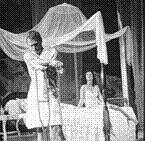 Time has
been kind to the saga of love, truth and death. In fact,
it's coarse, blunt characters and situations are more
accurate today than in 1955 when the language had to be
toned down, and a joke about a zoo elephant in heat
almost had the Broadway production closed on an obscenity
charge. Time has
been kind to the saga of love, truth and death. In fact,
it's coarse, blunt characters and situations are more
accurate today than in 1955 when the language had to be
toned down, and a joke about a zoo elephant in heat
almost had the Broadway production closed on an obscenity
charge. The story of Big Daddy's last birthday presents a family of characters who are blind, greedy, terrified, stupid, desperate and grasping. Though love and truth are often discussed, it is selfishness, possessiveness and hatred which propel this family of incredibly rich rednecks into emotional and psychological murder and suicide. 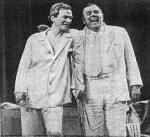 Emotion
and language are raw. Though all three of the play's
intelligent characters (Brick, Big Daddy and Maggie)
mourn the absence of real interpersonal communication,
they can be as crude and calculating as their opponents
in a struggle whose prizes are money and power. Emotion
and language are raw. Though all three of the play's
intelligent characters (Brick, Big Daddy and Maggie)
mourn the absence of real interpersonal communication,
they can be as crude and calculating as their opponents
in a struggle whose prizes are money and power. 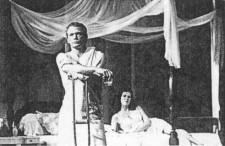 Most
revelatory is the confrontation scene between Big Daddy,
who means to get at the "not spoken," and
Brick, his alcoholic son and Maggie's turned-off husband.
Each, trapped in self-delusion, rejects the woman who is
his wife. And each, after his own fashion, resists her
protestations of love by saying, "Wouldn't it be
funny if it was true?" Most
revelatory is the confrontation scene between Big Daddy,
who means to get at the "not spoken," and
Brick, his alcoholic son and Maggie's turned-off husband.
Each, trapped in self-delusion, rejects the woman who is
his wife. And each, after his own fashion, resists her
protestations of love by saying, "Wouldn't it be
funny if it was true?" When it becomes agonizingly plain that Big Daddy can sooner resign himself to death than Brick can confront his homosexual nature, the play suddenly hits a raw nerve -- and an aspect of Brick's inner torment surfaces. 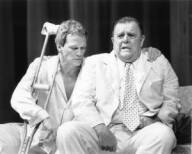 Tennessee
Williams loved CAT ON A HOT TIN ROOF. He called it his
favorite work and never stopped tinkering with it.
Williams wrote three versions of the third act, and most
productions -- this one included -- turn to a compromise
between a downbeat series of events and a tepid, 1955
Broadway compromise. Director Emily Mann worked with many
of the script revisions, playing "cut and
paste." The result is powerful to both the eye and
the ear. Tennessee
Williams loved CAT ON A HOT TIN ROOF. He called it his
favorite work and never stopped tinkering with it.
Williams wrote three versions of the third act, and most
productions -- this one included -- turn to a compromise
between a downbeat series of events and a tepid, 1955
Broadway compromise. Director Emily Mann worked with many
of the script revisions, playing "cut and
paste." The result is powerful to both the eye and
the ear.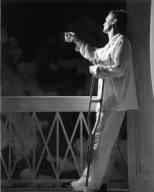 While
other productions have gone for the play's inescapable
quality that's commonly called sizzling, Mann appears to
have trusted its intrinsic verities. Here are two
flamboyant characters, Maggie and Big Daddy, so alive and
picturesque, and one, the besotted, defeated Brick, who
isn't -- but all are beyond judgment. While
other productions have gone for the play's inescapable
quality that's commonly called sizzling, Mann appears to
have trusted its intrinsic verities. Here are two
flamboyant characters, Maggie and Big Daddy, so alive and
picturesque, and one, the besotted, defeated Brick, who
isn't -- but all are beyond judgment.Themes of basic survival instincts are theatrically heightened. A consuming sensuality cuts through the steamy Southern night, but never touches real lives, locked up. If Williams had previously staked his claim as the poet of the dispossessed, here he proved as gallant in his understanding of the underhanded. 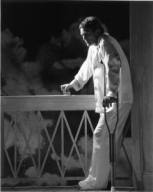 In
highlighting the graceful instrumentation of words and
the psychological awareness of character -- not that the
sizzle is slighted -- Mann has detected new truths. Isn't
it amazing that they're there, 37 years later, and
wouldn't it be funny if there were more? In
highlighting the graceful instrumentation of words and
the psychological awareness of character -- not that the
sizzle is slighted -- Mann has detected new truths. Isn't
it amazing that they're there, 37 years later, and
wouldn't it be funny if there were more?In this third act, when Maggie announces that she's pregnant and then undertakes to make the lie come true with her alcoholic, sexually repressed husband, Brick, we come as close as we ever will to believing she can pull the trick off. Mann's direction permits each of these admirable performances its own revelations while never losing sight of the motifs that bind them together. She uses the remarkable breadth and depth of the McCarter stage to emphasize the psychological spaces between her troubled characters, and her pacing of the text rightly recognizes that for all its baroque ornamentation, its silences are as important as its words. "Silence about a thing just magnifies it," Maggie says. "It grows and festers in silence, becomes malignant." That's part of the lesson of this considerable play, whose contrived but somehow apt ending suggests the rest of the message: that we can defeat such malignancies through the power of truth and love and hope. Synopsized from reviews by Ted Otten for the Times, Alvin Klein for the New York Times, Stuart Duncan for Princeton Packet and Clifford A. Ridley, Theatre Critic for The Philadelphia Inquirer "As Brick, James Morrison is first-rate as well, simultaneously evoking sympathy for the character's troubled psyche and exasperation at his self-pitying refusal to engage with anyone, himself included." Clifford A. Ridley "Mr. Morrison is thoroughly convincing as Brick, the ex-athlete and TV sportscaster who surely lowers the liquor level in Mercer County by his constant drinking. He seems sensitive and charming enough to explain his parents' preference for him over the awkward Gooper, and Maggie's determination to get him back in their bed, despite his recent surrender to alcohol." William McCleery, Theater Critic for Town Topics "Cheers for James Morrison's Brick for not falling into the trap of just letting the ex-football player spend his idle time on stage looking like a muscle-bound sleepwalker." Simon Saltzman, Theater Critic for Daily Record "James Morrison's slow burn as Brick is wonderful. He's particularly good with body language, never looking people in the eye and wiping his mouth when his wife sneaks a kiss." Marci Shatzman for The Trentonian |
|

